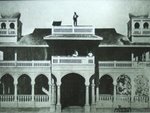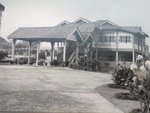On the subject of the Arabic words, which yesterday was specifically about the word 'mosque' I thought I will share some more articles which I have come across. This one is quite useful. It is written by Alan-Pimm Smith, a free-lance writer and a teacher in Saudi Arabia for the magazine Saudi Aramco World:-
"In some cases the English version of the word is as good as identical to its Arabic original, though others diverge in sound or meaning. Mosque doesn’t sound much like masjid, and though we can use bedouin in the singular, it is in fact taken from bidwan, a plural form of bedawi. Dhow comes from dawa, though if you ask any of your Arabic-speaking friends, you’ll find they don’t know the word, as it’s no longer in common use.
So far, no surprises: All the words mentioned refer to aspects of Arab or Islamic life, so naturally they are expressed in Arabic. But it may come as a surprise to learn that more familiar things, such as common fruits and vegetables, were once equally exotic. The fruits apricots, oranges, lemons and limes, and the vegetables artichoke, spinach and aubergine (eggplant) all have Arabic names, though they no longer taste or sound foreign. Lemon, for instance, came into medieval English from Middle French and before that from Middle Latin—with very little change in pronunciation in the process—from the Arabic laymun. Artichoke, on the other hand, is hardly recognizable as coming by way of Italian from the Arabic al-khurshuf.
There are in fact hundreds of Arabic loan words in the English language, though few of them have entered directly. For the most part, they have come disguised as French, Spanish, Italian or Latin words. For the past 1000 years, English has been voracious in its appropriation of foreign elements, and French- and Latin-origin words now account for approximately half the modern English vocabulary. French was the language of the English court, the nobility and parliament for at least 300 years following the Norman Conquest in 1066, and remained the language of the law in England right up until 1731.
In medieval times, then, it was largely through French that Arabic words entered the English language. And perhaps the most noticeable thing about these words is that the majority of them are technical terms relating in particular to mathematics, astronomy and chemistry. The word alchemy, which entered English in the 1300’s, comes almost unchanged from the Arabic al-kimya, which itself is derived from Greek. Alkali, algorithm, alembic and almanac entered the English lexicon about the same time. The syllable al- in these words comes from the Arabic definite article al (the). So, for example, alkali is derived from al-qili, defined as “the ashes of the saltwort plant.” An alembic is an apparatus formerly used in distillation and the word comes from al-inbiq, the still.
Arab-Islamic civilization was at its height during the Middle Ages, and for 500 years or so Arabic was the language of learning, culture and intellectual progress. Most of the classical Greek scientific and philosophical treatises were translated into Arabic during the ninth century. From this groundwork, Arab scholars, scientists, physicians and mathematicians made great advances in learning that were then passed on to western Europe via the Islamic universities in Spain. For example, we owe the decimal system of computation to Arab mathematicians, based as it is on the Indian concept of zero—a word that, like its synonym cipher, comes from the Arabic sifr, meaning empty.
Arabic learning was widespread in medieval England from the 11th to the 13th century, and indeed beyond. Abelard of Bath, then one of the foremost scholars in Europe, translated the astronomical tables of al-Khwarizmi from Arabic into Latin in the early 1100’s. Two common mathematical terms entered the language in this way: algebra and algorithm. The latter word is taken from al-Khwarizmi’s name itself, while algebra comes from al-jabr, meaning “the reunion of broken parts”; it’s a word that features in one of al-Khwarizmi’s mathematical treatises, Hisab al-Jabr w’ al-Muqabala. Curiously enough, both the Arabic al-jabr and the English word algebra also refer to the surgical treatment of fractures or bone-setting: The Oxford English Dictionary, which lists definitions according to historical usage, gives the first meaning of algebra as “the surgical treatment of fractures” and quotes a citation from 1565: “This Araby worde Algebra sygnifyeth as well fractures of bones, etc. as sometyme the restauration of the same.”
One of the greatest contributions made by Arab scholars to the extension of knowledge was their development of the science of astronomy. If you look at a modern star chart, you’ll find hundreds of stars whose names derive from Arabic: Altair, Aldebaran, Betelgeuse, Vega, Rigel and Algol, to name a few. The derivation of the last of these is intriguing: It comes from the Arabic al-ghul, a word meaning “demon,” from which the English word ghoul and its adjective ghoulish are also derived. Algol was named “the ghoul” by the Arabs because of its ghostly appearance, for, as an eclipsing binary star, it appears hazy and varies in brightness every two days. Beyond star names, many astronomical terms, among them zenith, nadir and azimuth, also derive from Arabic.
The words talisman and elixir originate in Arabic alchemy, and the word almanac (al-manakh) comes from Arabian astronomy. Other technical words include caliper, caliber, aniline, marcasite and camphor. We weigh precious stones in carats and measure paper in reams thanks to Arabic: girat is a small unit of weight; rizmah is a bale or bundle. Two other words of interest in this category are average and alcohol. Average, our word for a commonplace mathematical concept, is in fact somewhat obscurely derived from an Arabic word awariya, meaning damaged goods. This came about because costs relating to goods damaged at sea had to be averaged out among the various parties concerned in the trade.
As for alcohol, this is derived from al-kohl, the fine black powder that is used in the Middle East as a sort of medicinal eye shadow. The relationship between the black powder and alcohol as we know it is hardly self-evident, but you can see the connection if you think of the powder—it’s typically antimony sulfide—as the essence or pure spirit of a substance. Even as late as the 19th century, the poet Samuel Coleridge, in one of his essays on Shakespeare, could describe the villain Iago as “the very alcohol of egotism.”
The preponderance of technical and scientific terms entering English from Arabic during the Middle Ages suggests accurately enough the general superiority of Arab–Islamic civilization in the area of scientific achievement during this period. Revealing too is the fact that the next broad category of Arabic words suggests an advantage in terms of luxury and creature comforts and, consequently, a higher standard of living.
By the time of Elizabeth I (1533–1603), English merchant seamen were discovering the world beyond the boundaries of Europe and bringing back rich and exotic objects, materials and customs from the Middle East and beyond. Sig-nificantly, many of the Arabic words that travelers brought back with them at this time suggest a gracious, even luxurious style of living. Sugar, syrup, julep, sherbet and marzipan are all Arabic in origin, though none of them would have featured on the grocery list of an Elizabethan housewife. Coffee comes from the Arabic gahwah, which originated in Yemen, and mocha from the Yemeni port city. Added to this are the fragrant spices caraway, saffron, and cumin, all of which have Arabic names.
There is a parallel richness suggested by the names of such exotic fineries as sash, shawl, sequin, muslin, mohair, damask and cotton. Of these, muslin takes its name from Mosul in Iraq, where it was made, whereas sash is a variation of the Arabic for muslin, shash. The fabric damask, as one might expect, comes from Damascus. Even the word tabby, which we now apply to cats of a certain pattern, has its origin in a striped silk taffeta that was made in the al-Tabiyya district of Baghdad. The word sequin has its origin in Arabic sikkah, meaning a minting die for striking coins.
Sofa, alcove, jar and carafe, each suggestive in some way of comfortable living, have also been borrowed from Arabic: sofa comes from suffah (“a long bench”); alcove from al-qubbah (“the arch”); jar from jarrah (“an earthen water-vessel”); carafe from gharrafah (“bottle”). Our vocabulary has also been enriched by the colors crimson, carmine, azure and lilac, all of whose names are derived from Arabic. And as for leisure activities, there are such words as racket, as in “tennis racket,” from the Arabic raha, “the palm of the hand.”
The Arabs were always a seafaring and trading people, so it is hardly surprising to find words related to these activities in the store of Arabic loan words. Sailors speak of “mizzen masts” because the word for mast in Arab is mazzan. Admiral, rather oddly, comes from amir al-, a truncated form of amir al-bahr, “prince of the sea.” Arsenal derives from dar as-sina‘ah, a “house of manufacture,” or workshop, and before that from sina‘ah, meaning “art, craft, skill,” whereas magazine is borrowed from makhzan, “a storehouse.” The trade-related word tariff is also Arabic in origin.
There are many other interesting words—adobe, crocus, genie and popinjay, for example—that are all more or less garbled versions of Arabic words. Even the word garbled itself can be traced to Arabic, coming as it does from gharbala meaning “to sift or select,” with reference to spices for sale, and shifting its meaning from there to the idea of mixing and confusing. But garbled or not, the store of words derived from Arabic has greatly enriched the English language."













